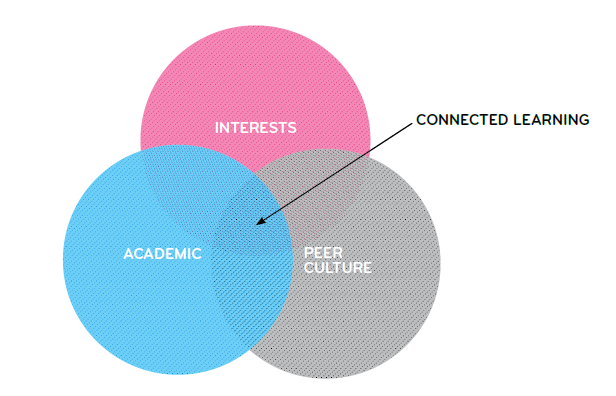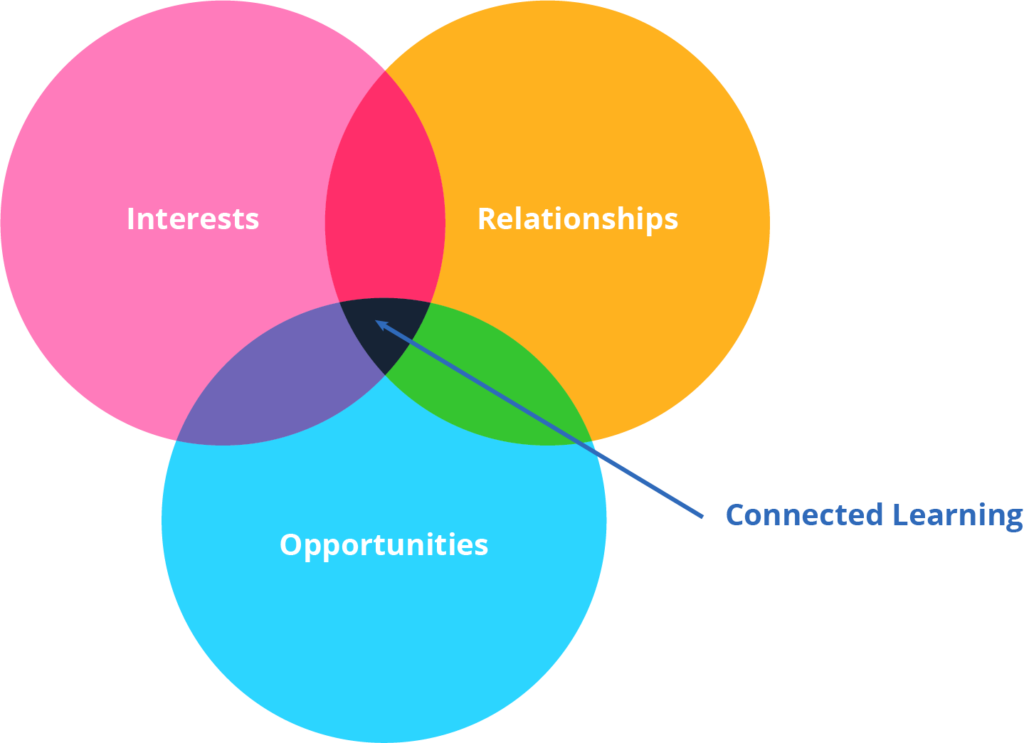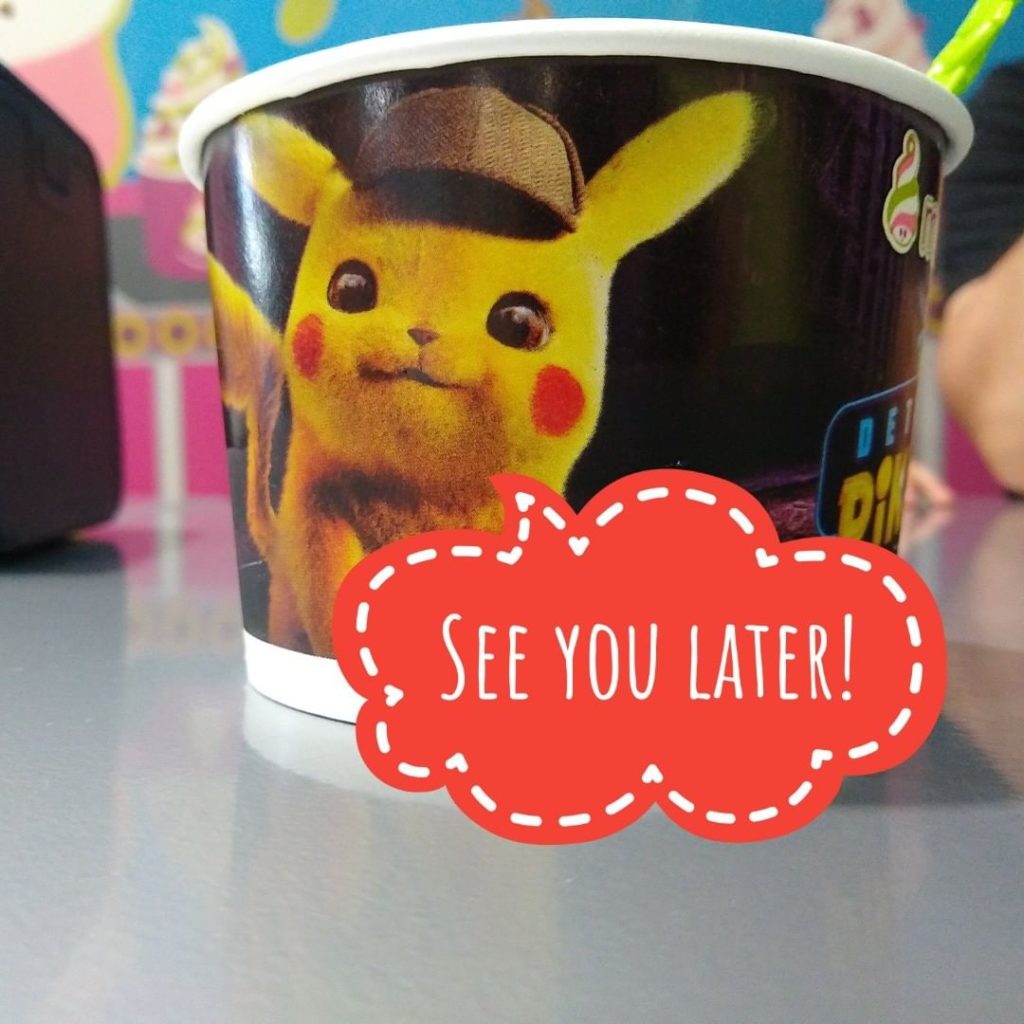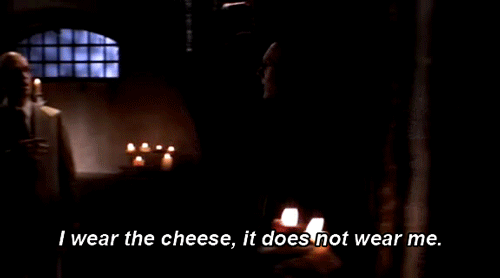Connected Learning can be conceived of in three ways: as a type of learning experience that occurs spontaneously, as an empirically-derived model or framework for describing that type of experience, and as an agenda for research and design approach for creating learning experiences. The model/framework was first described by Mizuko Ito, Kris Gutierrez, Sonia Livingstone, Bill Penuel, Jean Rhodes, Katie Salen, Juliet Schor, Julian Sefton-Green, and S. Craig Watkins in their report, Connected Learning: An Agenda for Research and Design (2013).
The Connected Learning framework incorporates three spheres of learning: interest-based learning, peer-based learning, and academic learning (Ito & Martin, Fall 2013). These spheres of learning are derived from the HOMAGO framework outlined in the report, Hanging Out, Messing Around, and Geeking Out: Kids Living and Learning with New Media (Itō et al., 2009). This report draws on three years of “ethnographic investigation of youth new media practice” (p. 2) examining how these practices fit into social and cultural worlds and how they are meaningful in youth’s everyday lives. Ito and colleagues found that youths’ new media practices tended to fall into one of three genres of participation: “hanging out,” a friendship-driven mode of participation, “geeking out,” an interest-driven mode of participation, and “messing around,” a mode of participation that tended to bridge the other two, in which either youth deepen their commitment to particular interests as they engaged in social practices, or in which youth engage in expanded social activity via participating in their current interests. Ito and colleagues found that young people transitioned easily between these three genres of participation.
The HOMAGO framework was derived from a study that was designed to describe current practices, especially in informal learning spaces (Ito et al., 2019). This study was not aimed at creating a design agenda for educational experiences or describing formal learning environments. Ito and colleagues (2009) found, however, that formal learning environments were often cut off from peer-driven or interest-driven learning environments. The Connected Learning environment seeks to incorporate academic, civic, and career opportunities with peer-driven and interest-driven learning, describing and expanding access to a mode of learning in which all three of these spheres overlap (Figure 1).
In its initial iteration, the Connected Learning framework encompassed six Connected Learning principles. The first three incorporated the spheres of learning: peer-supported, interest-powered, and academically-oriented. The other three principles described the kind of environments that tend to promote connected learning experiences: being production-centered, having a shared purpose, and being openly networked.
“Connected learning is a framework under constant development that offers principles and examples to be adapted and remixed rather than a template for programs and activities” (Ito & Martin, Fall 2013, p. 31). In the years since the model’s initial development, it has undergone some changes. A number of studies developed by the Connected Learning Research Network have provided new evidence that contributes to revision and refinement of the model (Arum, Larson, & Meyer, Forthcoming; Ben-Eliyahu, Rhodes, & Scales, 2014; Ching, Santo, Hoadley, & Peppler, 2015; Ito et al., 2019; Larson et al., 2013; Livingstone & Sefton-Green, 2016; Maul et al., 2017; Penuel, Van Horne, Santo, Ching, & Podkul, 2015; Van Horne, Allen, DiGiacomo, Chang-Order, & Van Steenis, 2016; Watkins et al., Forthcoming). The three spheres of learning have shifted slightly (see Figure 2): “peer-supported” has changed to “relationships,” to indicate not only peer-to-peer relationships but also relationships between young people and adult brokers or mentors, while “academically-oriented” has changed to “opportunities,” to include not just academic opportunities but also civic and career opportunities.
 Figure 1. Original spheres of learning.
Figure 1. Original spheres of learning.
 Figure 2. Revised spheres of learning.
Figure 2. Revised spheres of learning.
The other three principles of Connected Learning have shifted, as well (“About Connected Learning,” 2017). “Sponsorship of youth interests” is a new principle that was previously woven throughout the others; studies have consistently demonstrated that young people require adult assistance to make connections between their own interests and academic, civic, and career opportunity (Ching et al., 2015; Ito et al., 2019; Van Horne et al., 2016). This principle asks adults to reconsider their role in youths’ learning, to be more than either a “sage on the stage” or “guide on the side,” engaging in actively assisting youth in expanding their networks. “Production-centered” has shifted to being described as “shared practices,” including not just media production as the early model suggested, but also “friendly competition, civic action, and joint research” (“About Connected Learning,” 2017). “Shared purpose” remains, while “openly networked” has changed to “Connections across settings” to incorporate not just openly networked online platforms, but also connections between online and local affinity networks and relationships between home, school, and community.
All of the principles of Connected Learning are directed toward creating learning environments with an equity agenda, in which nondominant youth gain access to learning experiences that have historically been more available to those with privilege and financial access. Without attention to the cultural and social environment, new technologies like those that facilitate connected learning “tend to amplify existing inequity…access to social, cultural, and economic capital, not access to technology, is what broadens opportunity” (Ito et al., 2019, p. 6) (emphasis original).Youth need programs and mentors with social capital to broker connections; if brokering is treated as a market-driven process, this exacerbates inequity.
“The responsibility of providing mentorship, brokering, and connection building to link youth interests to opportunity is a collective one and cannot be shouldered only by families, nor only by schools and other public educational institutions. It entails a broader cultural shift toward recognizing the new learning dynamics of a networked era, paying more attention to learning and equity in online communities and platforms, and providing more educational supports in both formal and informal learning environments.” (Ito et al., 2019, p. 169)
Connected learning has often been conceived of as occurring along pathways, but recent research suggests that it “is more appropriately conceived of as the growth of a network of connections than as a linear pathway or an internalization of skills and knowledge” (Ito et al., 2019, p. 21). Connected learning is best seen “not as a journey of individual development that is transferrable across different settings that a person moves through, but as building stronger, more resilient and diverse social, cultural, and institutional relationships through time” (Ito et al., 2019, p. 167).
References
About Connected Learning. (2017, December 6). Retrieved April 12, 2019, from [clalliance.org/about-con...](https://clalliance.org/about-connected-learning/)
Arum, R., Larson, K., & Meyer, W. M. (Forthcoming). Connected Learning: A Study of Educational Technology and Progressive Pedagogy. New York: New York University Press.
Ben-Eliyahu, A., Rhodes, J. E., & Scales, P. (2014). The Interest-Driven Pursuits of 15 Year Olds: “Sparks” and Their Association With Caring Relationships and Developmental Outcomes. Applied Developmental Science, 18(2), 76–89.
Ching, D., Santo, R., Hoadley, C., & Peppler, K. (2015). On-ramps, lane changes, detours and destinations: Building connected learning pathways in hive NYC through brokering future learning opportunities. New York, NY: Hive Research Lab. [hiveresearchlab.](https://hiveresearchlab.) files. wordpress. com/2015/05/hive-research-lab-2015-community-white-paper-brokering-future-learning-opportunities2. pdf (accessed November 15, 2015).
Itō, M., Baumer, S., Bittanti, M., Boyd, D., Cody, R., Stephenson, B. H., … Tripp, L. (2009). Hanging out, messing around, and geeking out : kids living and learning with new media. Cambridge, MA: MIT Press.
Ito, M., Gutiérrez, K., Livingstone, S., Penuel, B., Rhodes, J., Salen, K., … Craig Watkins, S. (2013). Connected Learning: An Agenda for Research and Design. Irvine, CA: Digital Media and Learning Research Hub. Retrieved from [dmlhub.net/publicati...](https://dmlhub.net/publications/connected-learning-agenda-for-research-and-design/)
Ito, M., & Martin, C. (Fall 2013). Connected Learning and the Future of Libraries. Young Adult Library Services, 12(1), 29–32.
Ito, M., Martin, C., Pfister, R. C., Rafalow, M. H., Salen, K., & Wortman, A. (2019). Affinity Online: How Connection and Shared Interest Fuel Learning. New York: NYU Press.
Larson, K., Ito, M., Brown, E., Hawkins, M., Pinkard, N., & Sebring, P. (2013). Safe Space and Shared Interests: YOUmedia Chicago as a Laboratory for Connected Learning. Irvine, CA: Digital Media and Learning Research Hub. Retrieved from [dmlhub.net/publicati...](https://dmlhub.net/publications/safe-space-and-shared-interests-youmedia-chicago-laboratory-connected-learning/)
Livingstone, S., & Sefton-Green, J. (2016). The Class: Living and Learning in the Digital Age. NYU Press.
Maul, A., Penuel, W. R., Dadey, N., Gallagher, L. P., Podkul, T., & Price, E. (2017). Developing a measure of interest-related pursuits: The survey of connected learning. clrn.dmlhub.net. Retrieved from [clrn.dmlhub.net/wp-conten...](https://clrn.dmlhub.net/wp-content/uploads/2014/12/CRLN-Measurement-Paper-120714-for-CLRN.docx)
Penuel, W., Van Horne, K., Santo, R., Ching, D., & Podkul, T. (2015). Connected Learning: From Outcomes Workshops to Survey Items. Retrieved from [hiveresearchlab.](https://hiveresearchlab.)files.wordpress.com/2015/05/clrn-from-workshop-to-survey-items-report-may-2015.pdf
Van Horne, K., Allen, C., DiGiacomo, D., Chang-Order, J., & Van Steenis, E. (2016). Brokering In and Sustained Interest-Related Pursuits: A Longitudinal Study of Connected Learning. dml2016.dmlhub.net. Retrieved from [dml2016.dmlhub.net/wp-conten...](https://dml2016.dmlhub.net/wp-content/uploads/2016/02/14_vanHorne_CLRNBrokeringPaper040416_submit.pdf)
Watkins, C., Lombana-Bermudez, A., Cho, A., Vickery, J., Shaw, V., & Weinzimmer, L. (Forthcoming). The Digital Edge: How Black and Latino Youth Navigate Digital Inequality. New York: New York University Press.


 Figure 1. Original spheres of learning.
Figure 1. Original spheres of learning. Figure 2. Revised spheres of learning.
Figure 2. Revised spheres of learning.